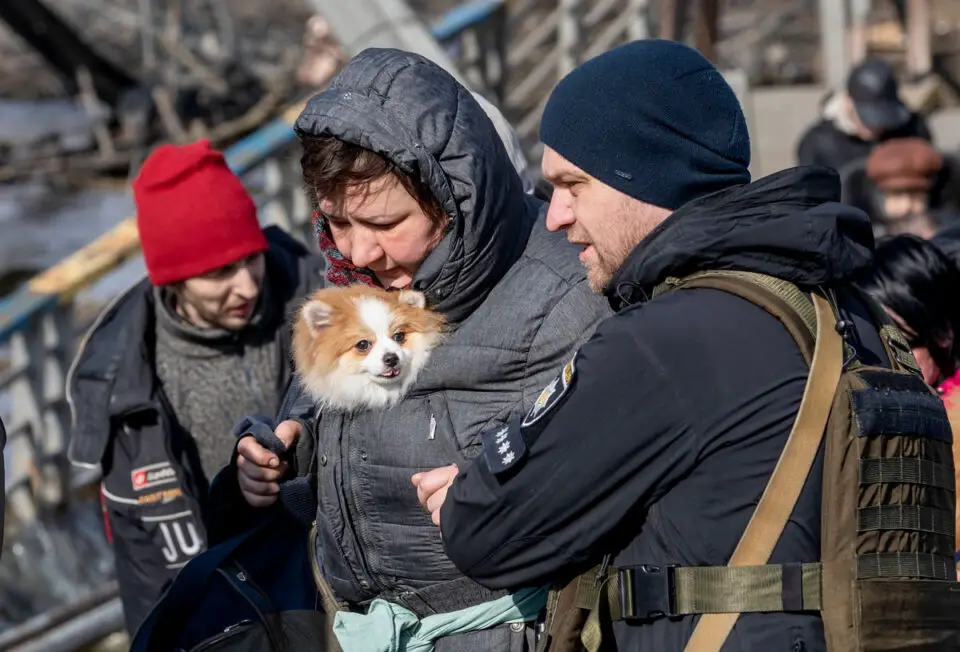REGION — Over the past several weeks, a wave of Eastern European refugees have sought shelter in the United States following Russia’s invasion of Ukraine.
Since the conflict began in February, hundreds of thousands of Ukrainians have fled their homes, and many have found themselves in Tijuana near the U.S.-Mexico border. On top of a grave humanitarian crisis, numerous refugees are being forced to abandon their pets in Mexico, according to two nonprofits and Carlsbad Councilman Keith Blackburn.
Blackburn, a longtime animal advocate, recently connected with Oceanside resident Erin Riley-Carrasco, owner of Alma Rescue, a local group that rescues animals and helps spay and neuter dogs in Tijuana and Vizcaino, Mexico.
Blackburn, attempting to understand the situation and policies involving refugees and their pets, contacted the Border Patrol, U.S. Customs, Centers for Disease Control and congressional representatives but was bounced from agency to agency.
After some continued digging, Blackburn was able to determine the policy for allowing dogs and other pets to enter the United States was inconsistent, at best.
“I got a panicked call from someone who said what can you do to help because we need help now,” Blackburn said. “What are the rules, what do they need and enforce consistently. That was just too much. I got frustrated and started working with Erin.”
Riley-Carrasco, who has described pets as “family members,” said some border agents will let families cross California’s southern border with dogs, while others do not. Others were forced to leave their beloved pets behind on the streets of Tijuana.
According to the New York Times, federal health regulations prohibit — except on an “extremely limited basis” — any dogs from entering the United States if they have been in any one of roughly 50 countries, including Ukraine. The Centers for Disease Control has classified these countries as “high risk” for rabies.
In some cases, Riley-Carrasco was able to connect with a shelter in Mexico to temporarily house refugee pets left at the border. Some vets have assisted the group by helping administer rabies vaccines, but frequent trips to the border have been difficult, costly and time-consuming.
“The last eight times I’ve crossed with a carload of dogs they haven’t even looked at the vaccination books I have,” Riley-Carrasco said. “All they require is an updated rabies vaccine after one month.”
Blackburn said he’s also asking the public to help with donations for this “unexpected expense.”
Recently, Riley-Carrasco said she’s been told by U.S. officials that another entry requirement for pets is proof of an antibody titer test, which is essentially bloodwork showing previous infections and immunities to specific diseases.
Riley-Carrasco and Blackburn said officials have also relayed concerns regarding a type of “dog flu,” possibly canine influenza, which is a contagious respiratory disease fatal to dogs (The disease cannot be transmitted to humans, according to the CDC).
Since launching her outreach efforts, Riley-Carrasco connected with Victoria Pindrik, founder of the Save Ukraine Relief Fund, a Los Angeles-based nonprofit dedicated to assisting refugees. Two days after the war began, Save Ukraine Relief Fund had boots on the ground in Poland to help refugees, providing humanitarian aid and helping with evacuations, housing, food, clothes and more.
But Pindrik, a Russian native who serves as a translator for displaced Ukrainians, is also helping make sure refugees remain with their pets during these uncertain times.
Pindrik said the stress and emotional toll of the war have been difficult for most and the thought of losing, or having to abandon a pet, adds to the rigors of having their lives altered forever.
“These pets are a part of their family,” Pindrik said.
Pindrik and Riley-Carrasco are also worried the Mexican government on April 22 may stop allowing refugees to enter the country via the “green corridor,” a dedicated pedestrian lane to help quickly process the influx of Ukrainians. According to various media reports, as many as 1,000 refugees are landing in Tijuana every day.
Mexican officials have also turned a sports complex in Tijuana into a refugee shelter, according to NPR.
A message left with the Mexican consult in San Diego was not returned.



